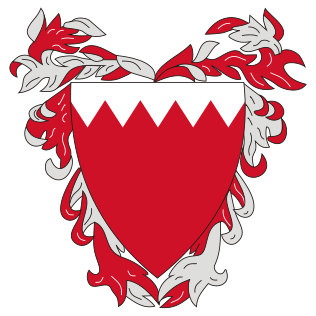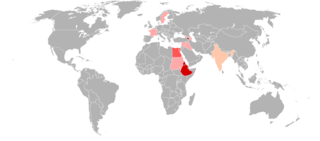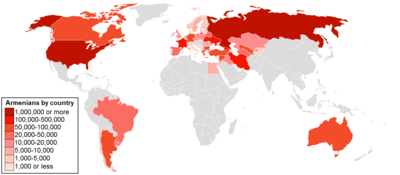Related Research Articles

Manama is the capital and largest city of Bahrain, with an approximate population of 200,000 people as of 2020. Long an important trading center in the Persian Gulf, Manama is home to a very diverse population. After periods of Portuguese and Persian control and invasions from the ruling dynasties of Saudi Arabia and Oman, Bahrain established itself as an independent nation in 1971 after a period of British hegemony.

Bahrain plays a modest, moderating role in regional politics and adheres to the views of the Arab League on Middle East peace and Palestinian rights. Since achieving independence in 1971, Bahrain has maintained friendly relations with most of its neighbours and with the world community. It generally pursues a policy of close consultation with neighbouring states and works to narrow areas of disagreement.

The Armenian Apostolic Church is the national church of the Armenian people. Part of Oriental Orthodoxy, it is one of the most ancient Christian institutions. The Kingdom of Armenia was the first state to adopt Christianity as its official religion under the rule of King Tiridates III of the Arsacid dynasty in the early 4th century. According to tradition, the church originated in the missions of Apostles Bartholomew and Thaddeus of Edessa in the 1st century.

Karekin I, served as the Catholicos of the Armenian Apostolic Church between 1994 and 1999. Previously, he served as the Catholicos of Cilicia from 1983 to 1994 as Karekin II.

The Catholic Church in Bahrain is part of the worldwide Catholic Church, under the spiritual leadership of the Pope in Rome.

The Apostolic Vicariate of Northern Arabia is a Catholic apostolic vicariate with official seat in Bahrain.
Armenians in the Middle East are mostly concentrated in Iran, Lebanon, Cyprus, Syria, Jordan and Jerusalem, although well-established communities exist in Iraq, Egypt, Turkey and other countries of the area including, of course, Armenia itself. They tend to speak the western dialect of the Armenian language and the majority are adherents of the Armenian Apostolic Church, with smaller Catholic and Protestant minorities. There is a sizable Armenian population in the thousands in Israel. There is also the Armenian Quarter in Jerusalem with a history that goes back 2,000 years. Armenians in Lebanon have the most freedoms, compared to other regions in the area that have large number of Armenians.

The Armenian Catholicosate of the Great House of Cilicia is an autocephalous Oriental Orthodox church. Since 1930, the Catholicosate of the Great House of Cilicia has been headquartered in Antelias, Lebanon. Aram I is the Catholicos of Cilicia of the Armenian Apostolic Church since 1995.
The Armenians in Kuwait are people of Armenian descent living in Kuwait. As of 2013, there has been a large population increase and now there are 6,000 Armenians. Before the Gulf War, the Armenian population reached its peak of 12,000. But after the Iraqi invasions, the numbers of the Armenians resident in Kuwait greatly diminished to just 500 as they left the country.

The Arab world consists of 22 states. As of 2018, the combined population of all the Arab states was around 407-420 million people.

Overseas Pakistanis refers to Pakistani people who live outside of Pakistan. These include citizens that have migrated to another country as well as people born abroad of Pakistani descent. According to the Ministry of Overseas Pakistanis and Human Resource Development, approximately 8.8 million Pakistanis live abroad according to December 2017 estimates, with the vast majority, over 4.7 million, residing in the Middle East. The second largest community, at around 1.2 million, live in the United Kingdom. According to the UN Department of Economic and Social Affairs, Pakistan has the 6th largest diaspora in the world. In 2021, overseas Pakistanis sent record remittances with growth at 26 percent and levels reaching $33 billion in 2021.
Paul-Mounged El-Hachem is Maronite prelate of the Catholic Church. He worked in the diplomatic service of the Holy See as Apostolic Nuncio to Kuwait, Bahrain, Qatar, United Arab Emirates and Yemen, and as Apostolic Delegate to the Arabian Peninsula. He headed the Maronite Catholic Eparchy of Baalbek-Deir El Ahmar from 1995 to 2005.

Bahrain, officially the Kingdom of Bahrain, is a country in the Persian Gulf. The island nation comprises a small archipelago made up of 50 natural islands and an additional 33 artificial islands, centered on Bahrain Island which makes up around 83 percent of the country's landmass. The country is situated between the Qatari peninsula and the north eastern coast of Saudi Arabia to which it is connected by the 25-kilometre (16 mi) King Fahd Causeway. According to the 2020 census, Bahrain's population numbers 1,501,635 people, of which 712,362 are Bahraini nationals. At 760 square kilometres (290 sq mi) in size, it is the third-smallest nation in Asia after the Maldives and Singapore. The capital and largest city is Manama.
Armenians in United Arab Emirates refers to ethnic Armenians living in the United Arab Emirates. They number around 5,000.
Ethnic Armenians in Qatar number between 800 and 1,500 and live mainly in the capital Doha. Unofficial sources place them at around 5,500.
The Armenian Prelacy of Canada, is a diocese of the Armenian Apostolic Church affiliated with the Holy See of Cilicia, formed in 2002. The prelacy building is located at 3401 Oliver Asselin in Montreal, Quebec, Canada.

Arshak Pavlovi Poladian (born May 15, 1950) is an Armenian diplomat,historian, orientalistand author. Since 2019, Dr. Poladian is Armenian's ambassador to Tunisia and Morocco with residence in Yerevan. Previously Poladian was ambassador extraordinary and plenipotentiary of Armenia to Syria from 2007 to 2018 and Armenia's non-resident ambassador to the Hashemite Kingdom of Jordan from 2011 to 2018. Poladian also served as the Armenian ambassador to the United Arab Emirates from 2002 to 2006, and as the Armenian ambassador (non-resident) to the State of Kuwait and Kingdom of Bahrain from 2003 to 2007.

Sepuh Sargsyan or Sebouh Sarkissian is an Armenian Apostolic clergyman. Currently he is prelate and archbishop of the Armenian Diocese of Tehran located at Saint Sarkis Cathedral, which is under the jurisdiction of the Holy See of Cilicia.
Nshan Ara Garabed Topouzian or Nshan Ara Karapet Topuzian was an Armenian Apostolic clergyman. From August 2002 to April 2010 he was Prelate and from 2006 also Bishop of the Armenian Diocese of Atrpatakan in Tabriz in Iran, which is under the jurisdiction of the Holy See of Cilicia.

Oriental Orthodox Churches are the churches descended from those that rejected the Council of Chalcedon in 451. Despite the similar name, they are therefore a different branch of Christianity from the Eastern Orthodox. Oriental Orthodoxy consists of several autocephalous and autonomous jurisdictions holding a single set of beliefs and united in full communion. However, they each have their own separate rites, and there are significant differences between their respective practices. Thus, there is more internal diversity of practice among the Oriental Orthodox than among the Eastern Orthodox.
References
- 1 2 3 "Archbishop Goriun Babian meets Bahrain and Khobar Armenians". Azad Hye. Archived from the original on 24 December 2013. Retrieved 16 August 2013.
- ↑ "Armenians of Bahrain". Azad Hye. Archived from the original on 30 January 2015. Retrieved 16 August 2013.
